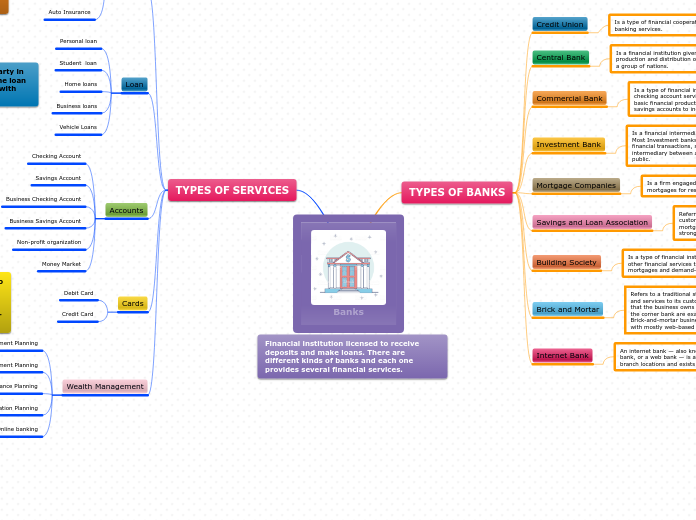
Banks
TYPES OF BANKS
Credit Union
Is a type of financial cooperative that provides traditional banking services.
Central Bank
Is a financial institution given privileged control over the production and distribution of money and credit for a nation or a group of nations.
Commercial Bank
Is a type of financial institution that accepts deposits, offers checking account services, makes various loans, and offers basic financial products like certificates of deposit (CDs) and savings accounts to individuals and small businesses.
Investment Bank
Is a financial intermediary that performs a variety of services. Most Investment banks specialize in large and complex financial transactions, such as underwriting, acting as an intermediary between a securities issuer and the investing public.
Mortgage Companies
Is a firm engaged in the business of originating and/or funding mortgages for residential or commercial property.
Savings and Loan Association
Referred to as S&Ls, provide many of the same services to customers as commercial banks, including deposits, loans, mortgages, checks, and debit cards.However, S&Ls place a stronger emphasis on residential mortgages.
Building Society
Is a type of financial institution that provides banking and other financial services to its members. These societies offer mortgages and demand-deposit accounts.
Brick and Mortar
Refers to a traditional street-side business that offers products and services to its customers face-to-face in an office or store that the business owns or rents. The local grocery store and the corner bank are examples of brick-and-mortar companies. Brick-and-mortar businesses have found it difficult to compete with mostly web-based businesses
Internet Bank
An internet bank — also known as a virtual bank, an online bank, or a web bank — is a bank that lacks any physical branch locations and exists only on the internet.
TYPES OF SERVICES
Insure
Life Insurance
Homeowners Insurance
AD&D Insurance
Auto Insurance
Loan
Personal loan
Student loan
Home loans
Business loans
Vehicle Loans
Accounts
Checking Account
Savings Account
Business Checking Account
Business Savings Account
Non-profit organization
Money Market
Cards
Debit Card
Credit Card
Wealth Management
Retirement Planning
Investment Planning
Insurance Planning
Education Planning
Online banking
